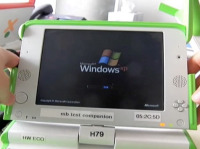During the Comes v. Microsoft court case, the discovery activity produced an interesting email exchange around Microsoft's attempt to influence One Laptop Per Child all the way back in October 2005. Reading the Microsoft emails about OLPC, I am not surprised at the level of fear that Microsoft had around the possible success of OLPC.
But I am surprised at the object of their fear - not Red Hat or FOSS, but Google. On October 17th, Will Poole said:
"Clearly we don't want a world where we're flat footed as Google figures out how to give states or countries $x in hardware subsidy based on the devices being somehow locked to google search."
At the same time, it is evident that Microsoft did not get the focus of the OLPC project. Microsoft saw the XO as another hardware platform, like a "$100 laptop" that they could put XP, or even an "Education Open Source" operating system. They didn't see the XO as a learning platform, an education project, only as a platform to dominate.
One way they thought to get in on OLPC was to consider funding the MIT Media Lab. Another was to have Bill Gates call Nicholas to med the rift between the two men. But whatever happened, Microsoft did want to come out looking like it tried. On October 16th, 2005, Craig Mundle emailed:
Remember that a key part of our strategy is to create a situation where even if Nick rejects us for philosophical reasons there is a long and visible history of our attempts to work with them and then we have to ask to get a license for the "open source hardware" and we will make our own offering on the commercial side.
Apparently, Microsoft's first attempt was a long meeting on Sunday, October 16th 2005, between their lead staff and Brightstar's President and CEO. Microsoft didn't have high hopes on a deal at the time:
In conclusion, going into the meeting, our confidence level in getting Nick to accept the Microsoft proposal was not high (between a 20-25% likelihood). Leaving the meeting, there were some points for revisions in our approach, but the net confidence level still remains relatively low.
Fast forward three years and look where Microsoft is now. We have XP on the XO, and because of that, a battle for the soul of OLPC. And one outstanding question: are Windows XO pilots more successful than Sugar pilots?
Special thanks to Jason Melton for the Comes v. Microsoft tip and help with transcription




And the Microsoft collaboration for XP on the XO continues - this time directly. From Community News:
Networking:
17. Michail worked with Keith Jeng at Quanta to bring them up to speed
with testing Windows on the XO. He has released a test image to Quanta,
and showed them how to write the image on the SD card. Keith's testing
is underway. He already has tested the image on older motherboards.
18. BSquare has received their test laptops for OFW qualification with
Windows XP. They will finalize their test arrangements before the new
year.
what we also had was a multi-year delay in progress and many countries around the world taking millions in Microsoft 'donations' which resulted in locking out an educational tool which happens to use GNU/Linux under the hood.
Just as Microsoft knew that if they took away distribution of Netscape Navigator, they also took away Netscape's income and revenue and therefore could not exist for long. Microsoft knows that a non-profit can not run forever on donations. So no matter how XP does on the XO, delaying, reworking, bumping its cost, etc all help the end game. To remove the project as a threat to their profits.
Both open source software AND GNU/Linux are threats to Microsoft's profits. With Windows bringing in billions in profit per quarter, spending a few hundred million or even a few billion to keep that train running is pretty much a SOP/business method of theirs. And this is not new to anyone who has followed them for a few years. My goodness, MS OOXML tricks to get ISO approval should clue people in.